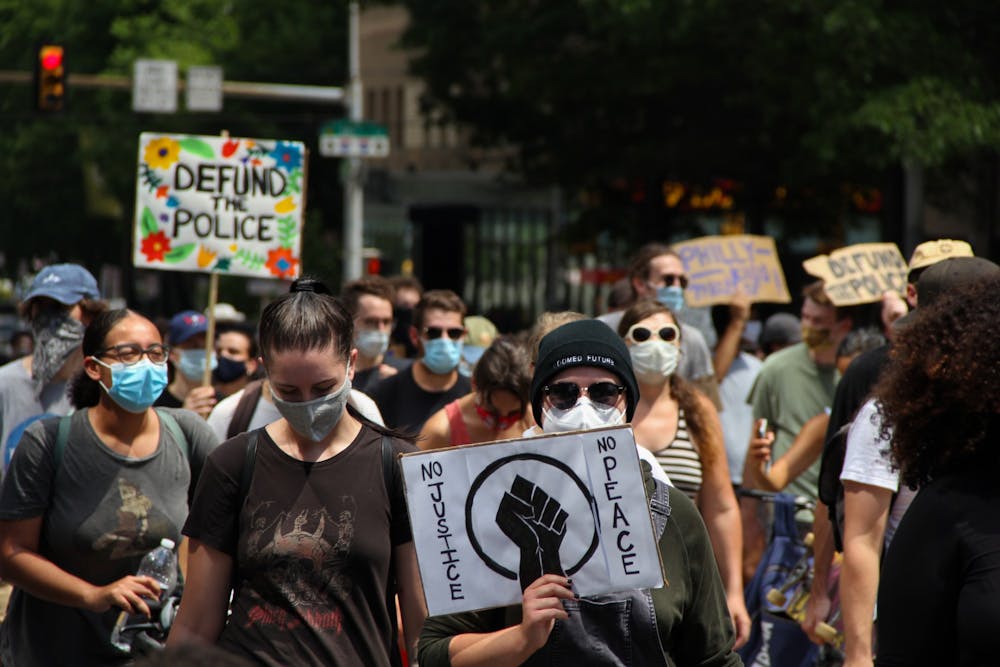One after another, activists from Penn and beyond have spoken out against police brutality. Police Free Penn, a student-led initiative, demands the disbandment of the University of Pennsylvania Police Department and “immediate severance of any future funding [from Penn]” to the Philadelphia Police Department. Citing systemic racism and continued violence against Black people, over 15,000 students have signed a petition asking Penn to end support for a "racist, fascist police state.”
With such enthusiasm, defunding the police appears to be the inevitable next step. But not everyone agrees. According to a New York Times poll of Minnesota voters from September, the majority of non-white likely voters oppose cuts to police funding even as the majority of Americans support the Black Lives Matter movement. This begs the question: why?
These numbers are a reminder that well-educated activists, many of them college students, are well to the left of most voters. Naively insisting that police divestment and abolition are the only solutions is an illustration that we live in a bubble that alienates us from the political reality. We are unaware that the people whose interests we claim we represent do not virtually agree with us.
Moreover, righteous rage has replaced careful research when we consider what we advocate, so much so that we are oblivious to the downsides of police defunding and abolition. To step outside the bubble, I suggest that we consider two questions before rushing to sign the Police Free Penn petition.
The first question is whether the police can effectively curb crime. The answer is mixed. Memphis, which struggles with police scheduling and deployment, saw an uptick in violent crime after it recruited more cops in 2017. But a larger police department does not mean more danger when it is competent. In Camden, New Jersey, where the crime rate historically ran high, the new and larger police force, which undergoes implicit bias training and strictly abides by “last resort” use-of-force policy, in fact led to improved police-civilian relations. Advocates say more professional officers on the street enabled police officers to have time to meet and build trust with the communities they are supposed to protect.
Residents’ rating of public safety services can shed light on their sense of safety. In Philadelphia, confidence in police services remains high: 48% rated the police services “Excellent” or “Good,” and 30% reported that the services were “Fair,” according to the 2019-2020 Philadelphia Resident Survey Report. Broken down by race, 18% of Black residents considered police services to be “Poor,” compared to 16% of white residents. Although there is ample proof of systemic racism in the criminal justice system, a majority of Philadelphians clearly does not want the police department to go.
The second question is how the police would respond to a budget cut. To answer that question, we must look at the dynamic between law enforcement and local government. Cash-strapped cities often depend on the police department to generate revenue.
In 2015, a Department of Justice investigation into the Ferguson Police Department, which was responsible for the murder of Michael Brown, an 18-year-old Black teenager, reveals that the city leadership had routinely urged the police officers to make up for the tax shortfall through fines, fees, and asset forfeiture. In 2013, the city’s finance director specifically asked the police department to deliver a 10% increase.
Ferguson is not alone in its malpractices. A report by Woodstock Institute, a non-profit research organization, finds that vehicle-related tickets make up more than 7% of Chicago’s annual budget. In Philadelphia, parking tickets alone are expected to generate $41.3 million in fiscal year 2018, which would fund pensions, school districts, and other city expenditures. A budget cut will limit the police’s ability to collect revenue, but will not alleviate the city’s reliance on it, unless it increases taxation or receives federal subsidies. Thus, to cope with a tighter budget and government pressure, downsized officers must resort to even more excessive and intrusive policing in neighborhoods. That would certainly make people’s lives harder.
What about dismantling the police department altogether? Police abolition could lead to a host of constitutional troubles. On Sept. 12, a Georgia Superior Court ruled the referendum dissolving the Glynn County Police Department unconstitutional, on the basis that it would infringe on the state’s authority to provide police services. This could repeat in Philadelphia, should residents vote to abolish the police department. The Constitution of Pennsylvania prohibits the “delegat[ion] to any special commission, private corporation or association, any power to make, supervise or interfere with any municipal improvement, money, property or effects.” That power includes the ability to regulate the police, too. Before activists bring police abolition on the ballot, the legal system would likely step in.
It has been six years since Americans gathered to protest the death of Eric Garner — police reforms are long overdue. Police Free Penn rightly points out the necessity to “reimagine police-free strategies for community safety and well-being.” But the gulf between imagination and reality runs deep.
We must step outside the bubble and recognize police abolition and defunding as not just catchy slogans, but complex reforms that involve cost-benefit analyses and trade-offs. Otherwise, calls for transformational changes may result in just the opposite of what we hope to accomplish.
BRUCE SHEN is a College first-year student from Shanghai, China studying German Studies. His email address is xshen01@sas.upenn.edu.









